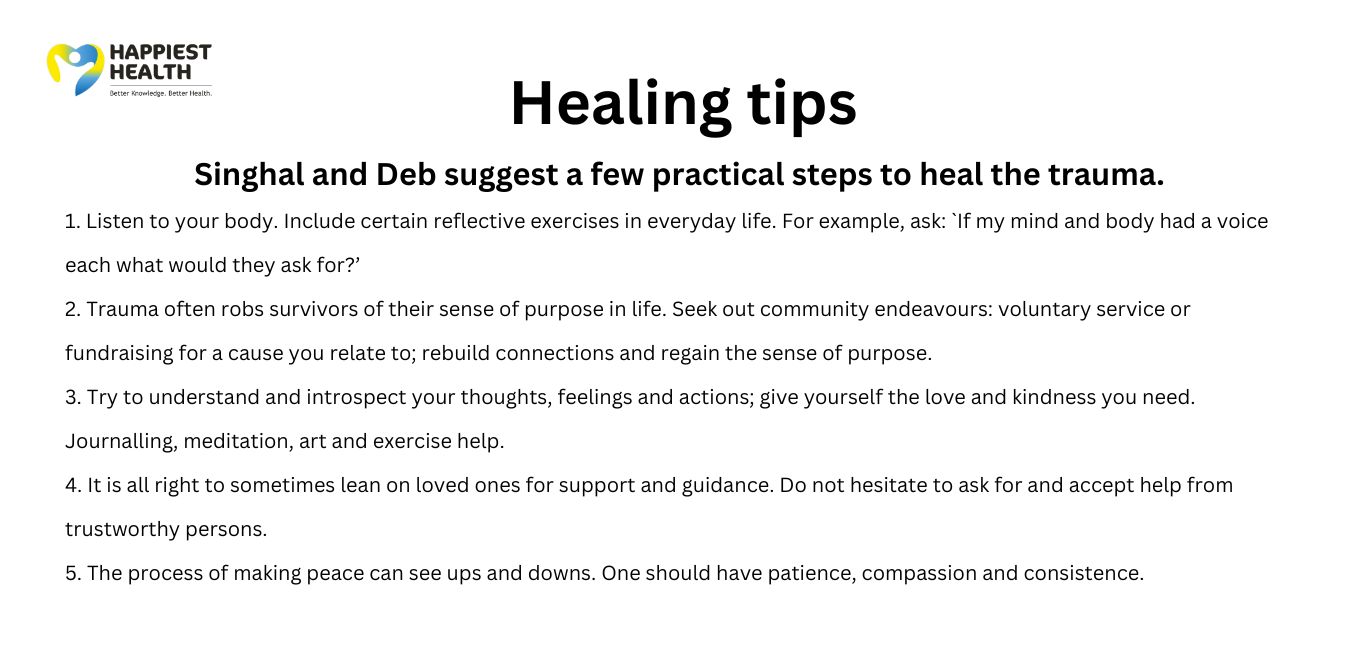
“After my aunt passed away suddenly during the second COVID-19 wave, it was as if my world stood still, while the rest of the world continued to go on like nothing had changed.”
That was Ria Thomas, a 25-year-old educator from Mumbai, who was devastated by the sudden loss of her aunt in 2021.
Two years on, the grief and residual trauma continue to affect her both mentally and physically. The family is finding ways to cope with the loss.
Ria and her family are among the many who have suffered from sudden trauma and continue to face difficulties in reconciling to their loss and moving on.
What trauma does to us
Dealing with tragic events in life and the resultant traumas is a challenging process that requires time, patience, and self-care. But before that, it is important for those individuals to acknowledge and process the associated emotions.
According to the American Psychological Association (APA), trauma is an emotional response to a terrible event like an accident, rape, or a natural disaster. The ways in which we respond to traumatic events from our past may significantly alter our cognitive and behavioural processes for an extended period of time.
Dr Meghna Singhal, Bengaluru-based trauma-informed psychotherapist, categorises these experiences into two types: big T and little t.
- A big T event is one that most people would consider traumatic, such as a plane crash or sudden and unexpected loss of a loved one.
- A little t event is experienced at a personal level, such as the loss of a pet or a breakup in a relationship.
The body responds first
When faced with a traumatic event, our body reacts by preparing us to respond. This is an automatic survival mechanism over which we have very little control.
A paper published in 2014 highlights the factors that determine the effect of trauma on an individual, including the person’s characteristics, the nature and features of the traumatic event(s), the individual’s stage of development, the significance of the trauma, and cultural and societal factors.
“Sometimes, our bodies and minds get stuck in this danger mode even when the threat has passed,” says Singhal, giving a graphic idea of it. “The brain becomes like a faulty smoke detector which keeps beeping even if there is no smoke. You may find yourself reliving the event through flashbacks or nightmares, feel constantly on edge, angry, guilty or upset, have panic attacks, feel numb or get distant from others or have problems sleeping.”
Not addressing the resultant emotions can make one vulnerable to developing mental health problems in the future. In some cases, it can also cause post-traumatic stress disorder (PTSD), a clinical condition that requires serious medical attention.
Coping with trauma
Dealing with past traumas and sad events is a crucial step towards healing and personal growth. By addressing these experiences, individuals can process and work through the emotions attached to them.
“The journey of dealing with trauma is not linear and there are several stages involved. These stages are not watertight and one may move back and forth,” says Zena Deb, consultant clinical psychologist at Mon Psychiatric Nursing Home Trust in Kolkata.
“The first and most crucial step is acknowledgment and self-awareness,” says Singhal. “As our minds get disconnected from our bodies due to trauma, we might find it helpful to start paying attention to our bodily sensations.”
Understanding how one’s body acts in response to specific triggers and why it does so is the beginning of a trauma management journey. She emphasises the importance of examining one’s thought and behaviour patterns, retaining helpful ones and transforming those that are hindering personal growth and well-being.
The benefits of making peace
Deb adds, “Once someone has made peace with their trauma they’d feel confident of handling various life situations and be able to function effectively on a day-to-day basis.” One would feel safe and secure and less anxious, stressed, overwhelmed or depressed; and ready to seek help if necessary.
To deal with trauma in a holistic and informed manner, it is advisable to see a mental health practitioner.


















